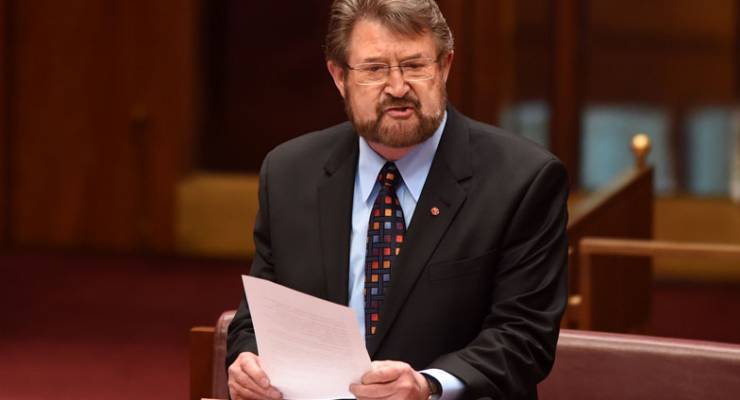
Media outlets have been cautious in reporting Derryn Hinch’s maiden speech in the Senate last night, with some naming a few of the convicted sex offenders he named under parliamentary privilege, and most choosing not to name any at all.
Under parliamentary privilege, Hinch faces no legal repercussions from naming the string of convicted paedophiles in the Senate last night. Crikey‘s own legal advice says that Hinch’s absolute privilege extends to broadcasts of his speech (Sky News and the ABC aired the speech live), but any other reporting can only rely on qualified privilege — the media is protected in repeating Hinch’s comments (though not necessarily anything more about the cases) so long as they’re part of a fair and accurate report of parliamentary proceedings.
Even so, most media outlets still chose not to name any of the men identified by Hinch.
Channels Nine and Ten had only moments to prepare their stories for their evening news bulletins, as Hinch’s speech ended just before 6pm. On Channel Nine, the legal advice must have been to stay quiet:
“He went on to name four convicted paedophiles, which we cannot name. He has the freedom which a journalist can only dream of.”
Channel Seven had fewer concerns, airing footage of Hinch’s speech in which he named three Victorian sex offenders. Hinch was aired saying:
“Then there are the two Victorian degenerates who I named on the steps of Parliament House and because of it, spent five months under house arrest and lost my job at 3AW … and how ’bout that evil creature Brian Keith Jones.”
Seven’s report aired Hinch naming two people whose names have not been reported elsewhere — Crikey has not looked into their cases and so has decided not to repeat them, although we believe that legally we would be allowed to.
[Brace yourselves: Derryn Hinch has parliamentary privilege]
Fairfax’s titles made the decision not to report any of the names at all, but not for legal reasons. “We opted against publishing the names for a number of reasons, the biggest being serious concerns about inadvertently identifying victims,” federal editor and Canberra bureau chief Bevan Shields told Crikey. “Parliamentary privilege is an important mechanism, and while it does allow us to report what has been said, it doesn’t mean we should suspend our ordinary editorial checks and balances.”
News Corp’s titles were split on how they treated the issue. The Daily Telegraph didn’t name anyone identified by Hinch, but the Herald Sun named Jones.
The Australian‘s report contained two names — Jones and another man, Juan Carlos Cruz, who Hinch said was a “Canberra degenerate” who should be deported if he wasn’t an Australian citizen (Cruz, Hinch said, was born in El Salvador). Asked why the Oz named just those two, editor John Lehmann told Crikey: “We believe the names we published were of significant interest to our readers.”
The ABC also identified Cruz in its report — a spokesman said the decision was made “following legal advice, as per normal process”.
Digital outlets like The Guardian, BuzzFeed and the Daily Mail also tread carefully, with the first two opting not to name any of those identified by Hinch.
[‘You can’t shut down the internet’: the futility of suppression orders]
But most online news relied on AAP’s copy. Its final report on the speech named Jones, like the Herald Sun, but none of the others. AAP editor-in-chief Tony Gillies told Crikey that Hinch’s absolute privilege didn’t extend to media, which meant it had to be careful. The whole thing, he says, was something of a “minefield”.
“We’re required to write a fair report but subject to suppression orders and general contempt issues. This requires a thorough investigation, tracking back through original notes and documents to identify these orders.
“Further, there are individual state laws that in some cases — to my understanding — override proceedings, so depending on where the offenders come from or where the offences occur, we are subject to these reporting protocols too. As a national media body our news coverage blankets all of these jurisdictions, so it’s a minefield. Hinch’s speech was around 5.20pm, so we were unable to complete investigations in time for our story last night.
“We recognise that Derryn Hinch’s naming and shaming paedophiles is a part of his life’s work and this will be a feature of his tenure as senator. But AAP’s editorial coverage has extraordinary reach in print, broadcast and digital, so we bear the responsibility to report fairly and accurately and without the risk of disrupting legal proceedings.”








“Hinch faces no legal repercussions from naming the string of convicted paedophiles in the Senate ….”
That sentence could be taken at least two ways!
Heh, it could indeed.
Probably safer for ‘print’ / electronic media to put links to, or quotes from, Hansard. I’ll spare you the angst of deciding whether to block this post by not doing that. :^)
Or this prosaic potpourri ““He went on to name four convicted paedophiles, which we cannot name. He has the freedom which a journalist can only dream of.”“.
Paedophiles, whom we … and the freedom of which a journalist can only dream .
Of the H/H hissownself, and his antics, I cannot bear to think.
I think that the press should make a point of not reporting anything about Hinch on principle, and especially what he says. He is so full of himself, it is all his raisin d’être to gain publicity.
In this way being different from every other politician?